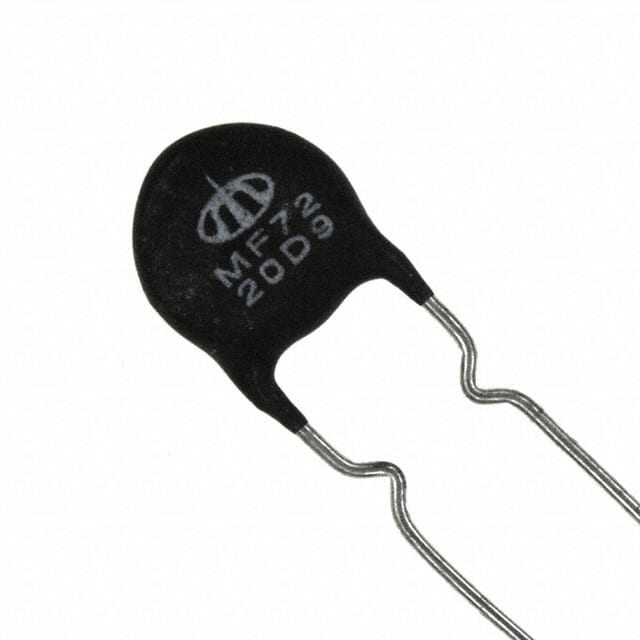MF72-020D9
Product Overview
Category
The MF72-020D9 belongs to the category of thermistors, specifically a type of NTC (Negative Temperature Coefficient) thermistor.
Use
It is commonly used for temperature sensing and compensation in various electronic circuits and devices.
Characteristics
- Temperature Sensing: The MF72-020D9 exhibits a change in resistance with temperature, making it suitable for temperature measurement applications.
- Stability: It offers stable and reliable performance over a wide temperature range.
- Compact Size: The thermistor is compact, allowing for easy integration into electronic circuits.
- High Precision: It provides accurate temperature measurements due to its high precision characteristics.
Package
The MF72-020D9 is typically available in a small, cylindrical package.
Essence
The essence of the MF72-020D9 lies in its ability to accurately sense and respond to changes in temperature, making it an essential component in various electronic systems.
Packaging/Quantity
It is commonly packaged in reels or trays, with quantities varying based on manufacturer specifications.
Specifications
- Resistance at 25°C: 20Ω
- Tolerance: ±10%
- Maximum Power Rating: 0.5W
- Operating Temperature Range: -55°C to 125°C
- Thermal Time Constant: 15s (in still air)
Detailed Pin Configuration
The MF72-020D9 features two leads, with the resistance measured across these leads exhibiting the NTC behavior.
Functional Features
- Temperature Sensing: The primary function of the MF72-020D9 is to sense temperature changes and exhibit a corresponding change in resistance.
- Temperature Compensation: It can be used to compensate for temperature variations in electronic circuits, ensuring stable performance.
Advantages
- High Sensitivity: The thermistor offers high sensitivity to temperature changes, enabling precise measurements.
- Wide Operating Temperature Range: It can operate effectively across a broad temperature range, enhancing its versatility.
- Compact Design: Its small size allows for easy integration into various electronic devices and systems.
Disadvantages
- Tolerance: The tolerance of ±10% may require additional calibration in some applications to achieve desired accuracy.
- Non-linear Response: Like other NTC thermistors, the MF72-020D9 exhibits a non-linear response to temperature changes, requiring appropriate compensation in certain applications.
Working Principles
The MF72-020D9 operates based on the principle of NTC thermistors, where its resistance decreases as the temperature increases. This characteristic is utilized for temperature sensing and compensation in electronic circuits.
Detailed Application Field Plans
The MF72-020D9 finds application in various fields, including: - Temperature Measurement: Used in temperature measurement and control systems in industrial and consumer electronics. - Automotive Electronics: Employed in automotive applications for temperature monitoring and compensation. - Medical Devices: Utilized in medical equipment for temperature sensing and control.
Detailed and Complete Alternative Models
Some alternative models to the MF72-020D9 include: - NTC Thermistor Model A: Similar specifications with a tighter tolerance for higher precision applications. - NTC Thermistor Model B: Offers a wider operating temperature range for extreme temperature environments.
In conclusion, the MF72-020D9 NTC thermistor serves as a crucial component in temperature sensing and compensation applications, offering high sensitivity and stability within a compact design. Its wide operating temperature range makes it suitable for diverse electronic systems, despite its inherent non-linear response and tolerance considerations.
Word Count: 511
Senaraikan 10 soalan dan jawapan biasa yang berkaitan dengan aplikasi MF72-020D9 dalam penyelesaian teknikal
What is MF72-020D9?
- MF72-020D9 is a type of NTC thermistor, which is a temperature-sensitive resistor that exhibits a decrease in resistance with an increase in temperature.
What are the typical applications of MF72-020D9?
- MF72-020D9 is commonly used for temperature compensation, temperature measurement, and temperature control in various electronic devices and circuits.
What is the resistance value of MF72-020D9 at room temperature?
- The resistance value of MF72-020D9 at room temperature is 20 ohms.
How does MF72-020D9 behave in response to changes in temperature?
- MF72-020D9 exhibits a negative temperature coefficient (NTC), meaning its resistance decreases as the temperature increases.
Can MF72-020D9 be used for overcurrent protection?
- Yes, MF72-020D9 can be utilized for overcurrent protection due to its ability to exhibit a significant change in resistance when subjected to high currents.
What are the operating temperature ranges for MF72-020D9?
- The typical operating temperature range for MF72-020D9 is -55°C to 125°C.
Is MF72-020D9 suitable for battery pack protection?
- Yes, MF72-020D9 can be employed in battery pack protection circuits to monitor and regulate the temperature of the battery cells.
Can MF72-020D9 be used in automotive applications?
- Yes, MF72-020D9 is suitable for automotive applications such as temperature sensing in engine management systems and climate control units.
What are the key advantages of using MF72-020D9 in technical solutions?
- Some advantages of MF72-020D9 include its small size, fast response to temperature changes, and high reliability.
Are there any precautions to consider when integrating MF72-020D9 into a technical solution?
- It's important to ensure proper thermal management and avoid exceeding the maximum power ratings to prevent damage to the NTC thermistor.


